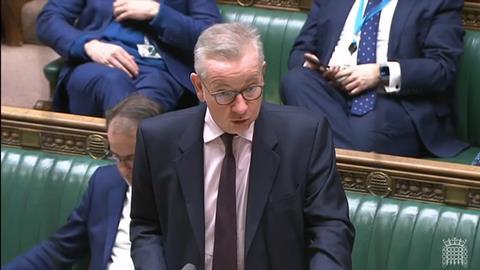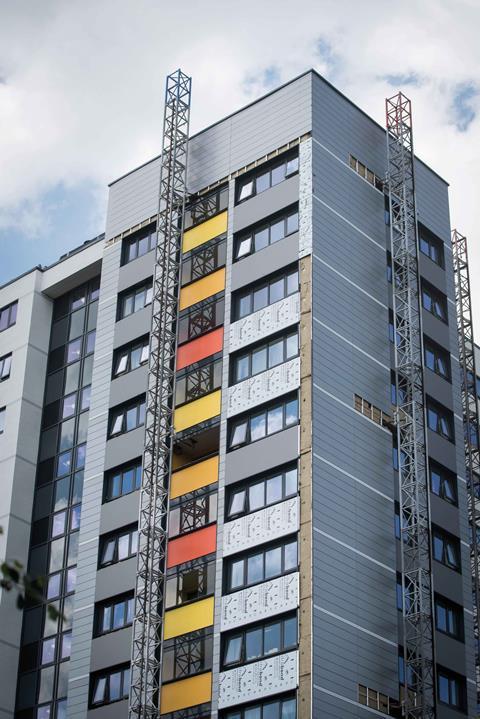HBF accuses the government of issuing ‘disproportionate’ threats against the industry over fire safety repairs
The principle trade body representing housebuilders is taking legal advice following a public threat by Michael Gove to stop them from trading if they don’t pay into a £4bn fund to help leaseholders hit by the fire safety crisis.
The Home Builders Federation made the admission in a statement in which it accused the government of not working “constructively” to find a solution to the crisis, and instead hurling “clearly not proportionate” threats against the industry.

The statement from UK housebuilders, issued late on Friday, follows the unexpected publication the night before of an open letter from the Department for Levelling Up, Housing and Communities (DLUHC) to all UK housebuilders with annual profit of more than £10m, calling on them to sign a heads of terms agreeing to pay the £4bn levy.
The letter, signed by Richard Goodman, director general of safer and greener buildings at DLUHC, says housebuilders will only receive government services and support on “financing, procurement, planning, building control, housing investment, and industry development and leadership” if they sign up to the commitment.
It adds that: “The Secretary of State has made clear he is willing to explore taking further steps to ensure the only participants in this market are those who have committed to resolving this crisis.”
>> Can Gove really ‘go after’ developers for £4bn of cladding costs?
>> Does Gove’s £4bn cladding levy mark the start of an anti-development era?
A number of housebuilders spoken to by Housing Today said the heads of terms amounted to a legally binding but entirely open-ended financial commitment which no chief executive could agree to – given that both the amount of the levy and the way of calculating it is yet to be determined.
The move follows Michael Gove’s decision last month to force housebuilders and product manufacturers to pay up to £4bn into a fund to pay for repair works to mid-rise buildings affected by the fire safety crisis.
The industry had responded by saying it supported protecting leaseholders from any costs of repair work and would work with the government on the measure, but questioned the £4bn figure and said the payment should be expanded to cover overseas developers.

However, one senior industry figure said, on condition of anonymity, that the latest move by government was “quasi-Marxist” and legally “very questionable”. Another industry executive said the requirement to sign up to a potentially limitless levy, on pain of having your business shut down was “extraordinary” and will have hardened industry chief execs against contributing to the fund. “The industry was very much listening to the government on this,” he said. “But this completely de-rails that.”
The industry says it has already set aside £1bn to pay for repair works, and is due to pay at least £2bn into a new tax designed to pay for work on high-rise homes with problems over the next 10 years.
A spokesperson for the HBF said in a statement: “Throughout this process so far the industry has engaged constructively with Government to find solutions and remove the burden of costs to remediate buildings from leaseholders. It is clear from today’s open letter that government is not taking the same approach.
“The latest proposal, an open-ended and variable annual tax on UK home builders at a rate decided by a government department each year, under the threat of being unable to operate in the UK, is clearly not proportionate. We are considering our position on the legality of the proposals”.
The HBF also hinted that the government’s approach failed to recognise the government’s own culpability for the fire safety crisis, through having set the regulatory framework under which all the buildings now needing to be repaired were approved.
“As the Grenfell Inquiry is shortly to consider, Government also needs to recognise the failings of its Building Regulations regime on which the industry has relied.
“We will continue to discuss the matter with Government in a reasonable and rational way and hope that will be reciprocated.”
Gove has said he wants to conclude a deal with the housebuilding industry by Easter, a timetable described last week by the HBF as “extremely challenging”.
The letter also made clear the government wants to be able to issue a press statement at some point this month hailing a number of early-adopting housebuilders who have signed up to the government’s heads of terms.
Beyond paying in to the government’s remediation fund, the letter stated it expects developers to also pay for all the remediation work necessary on any buildings constructed by them in the last 30 years, provide detailed data returns, and ensure senior officers in companies are checked as being “fit and proper persons to undertake major scale development”.
The full HBF statement in response to the DLUHC open letter:
“Throughout this process so far the industry has engaged constructively with Government to find solutions and remove the burden of costs to remediate buildings from leaseholders. It is clear from today’s open letter that government is not taking the same approach.
“UK home builders, responsible for only a minority of the affected buildings, have already spent or committed around £1bn to remediate buildings and the new Residential Developers Tax and Building Safety Levy will raise billions more from these companies.
“The latest proposal, an open-ended and variable annual tax on UK home builders at a rate decided by a government department each year, under the threat of being unable to operate in the UK , is clearly not proportionate.
“We are considering our position on the legality of the proposals, which target only UK home builders who are already working on their buildings and not the plethora of foreign companies and investment vehicles responsible for a large proportion of the remaining buildings that require remediation.
“We continue to call on Government to ensure material providers, including overseas companies that manufactured and sold the materials that have created the problems, are part of the solution.
“As the Grenfell Inquiry is shortly to consider, Government also needs to recognise the failings of its Building Regulations regime on which the industry has relied. We will continue to discuss the matter with Government in a reasonable and rational way and hope that will be reciprocated.”











No comments yet